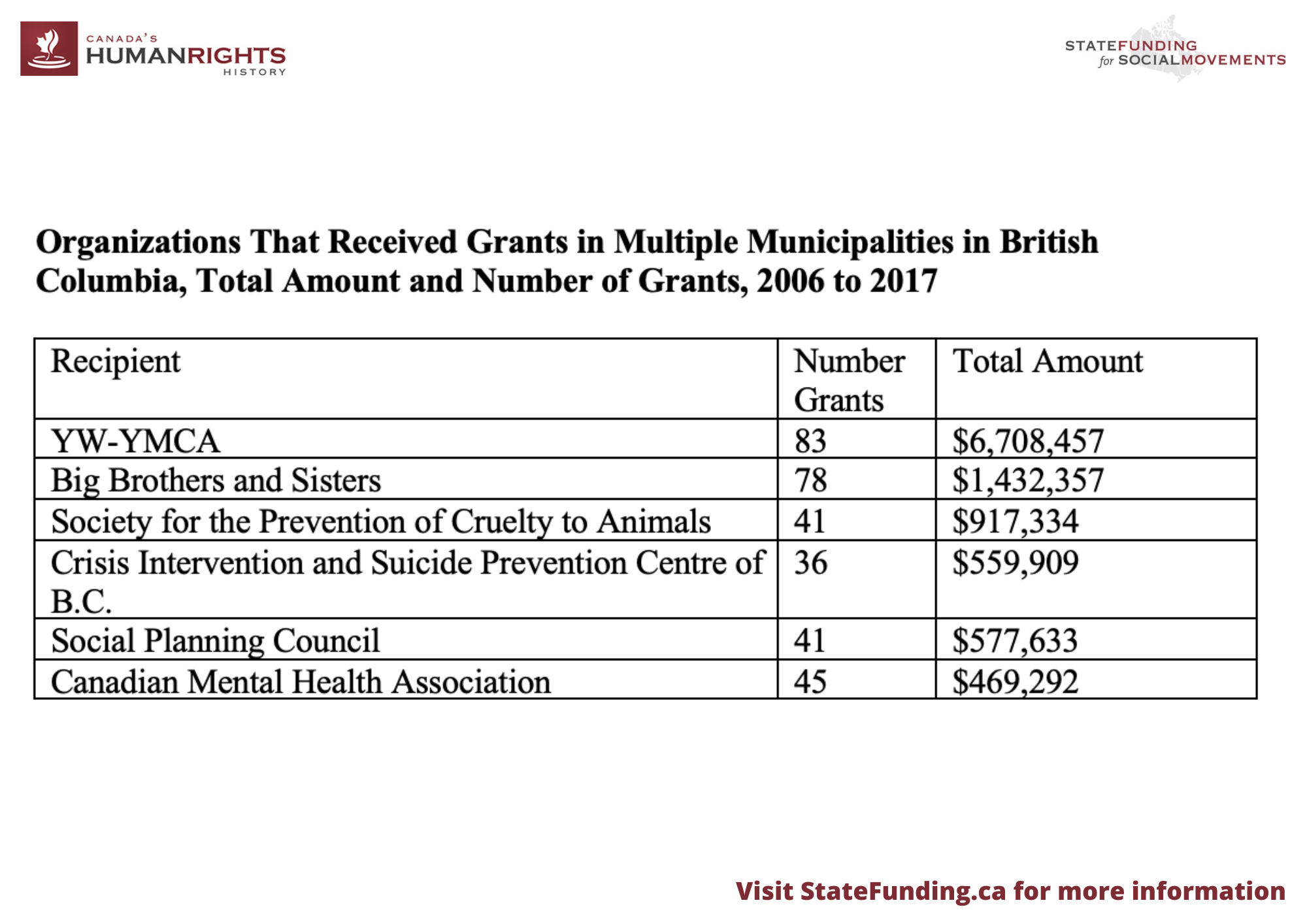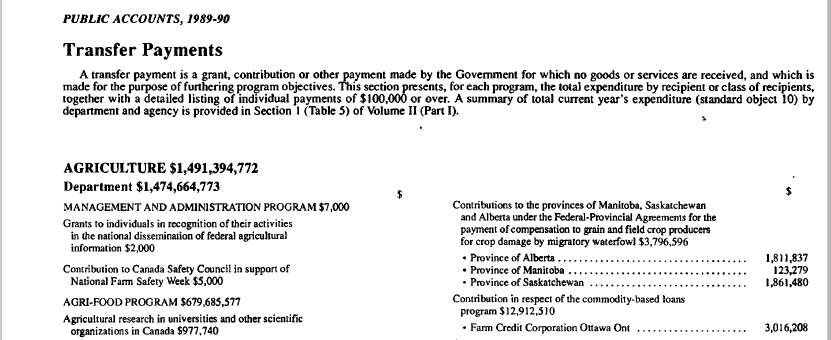Municipalities are indispensable to the public funding ecosystem for the nonprofit sector. In fact, amidst the unpredictability of provincial and federal funding in recent years, municipal funding has continued to increase over time. Using grants data from 21 municipalities in British Columbia, our research shows how the overall amount of municipal funding increased most years between 2006 and 2017. Funding in Squamish, for example, increased 282 per cent while funding in Port Moody skyrocketed 620 per cent. In Powell River, grant funding was $75,071 in 2006 and over $1 million in 2017. Grant funding was at least 50 per cent higher over ten years in most municipalities. Vancouver distributed $26.3 million in grants in 2017 alone.
Public funding for nonprofit organizations serves a mutually beneficial function. Nonprofits provide critical public services, advocate for social change, and offer community input for public policy. Governments, in turn, use nonprofits as a low-cost alternative to provide public services and to advance state policy. The relationship between the nonprofit sector and municipalities is especially vital in British Columbia. The province provides extensive services through local governments, which is one reason why British Columbia has among the largest number of local governments in the country. They also have a high degree of autonomy. The province’s municipalities are responsible for emergency planning; parks and recreation; air quality; fire protection and policing; economic development; licensing businesses; regulating buildings; social planning; and much more.
The data reveals how municipalities have had a profound impact on the nonprofit sector. At least 3337 organizations have received a municipal grant from these 21 municipalities alone between 2006 and 2017. In a province where, according to Statistics Canada, there were 20,270 nonprofit organizations in 2003, it is likely that a significant number of these organizations – if not a majority – have at least once benefitted from municipal funding (there are 162 municipalities in British Columbia). Symphonies, museums, art galleries, transition homes, Indigenous friendship centres, theatres, heritage foundations, and business improvement organizations among others have regularly received, if not relied upon, municipal grants. Municipalities’ impact on the nonprofit sector, however, is limited by four common funding practices.
First, rather than support a diversity of nonprofit organizations, more than half of municipal funding was for arts, culture, heritage, economic development, and recreation. Every municipality prioritized these five sectors. Other sectors, such as health, environment, housing, advocacy, or religion received far less grant funding.
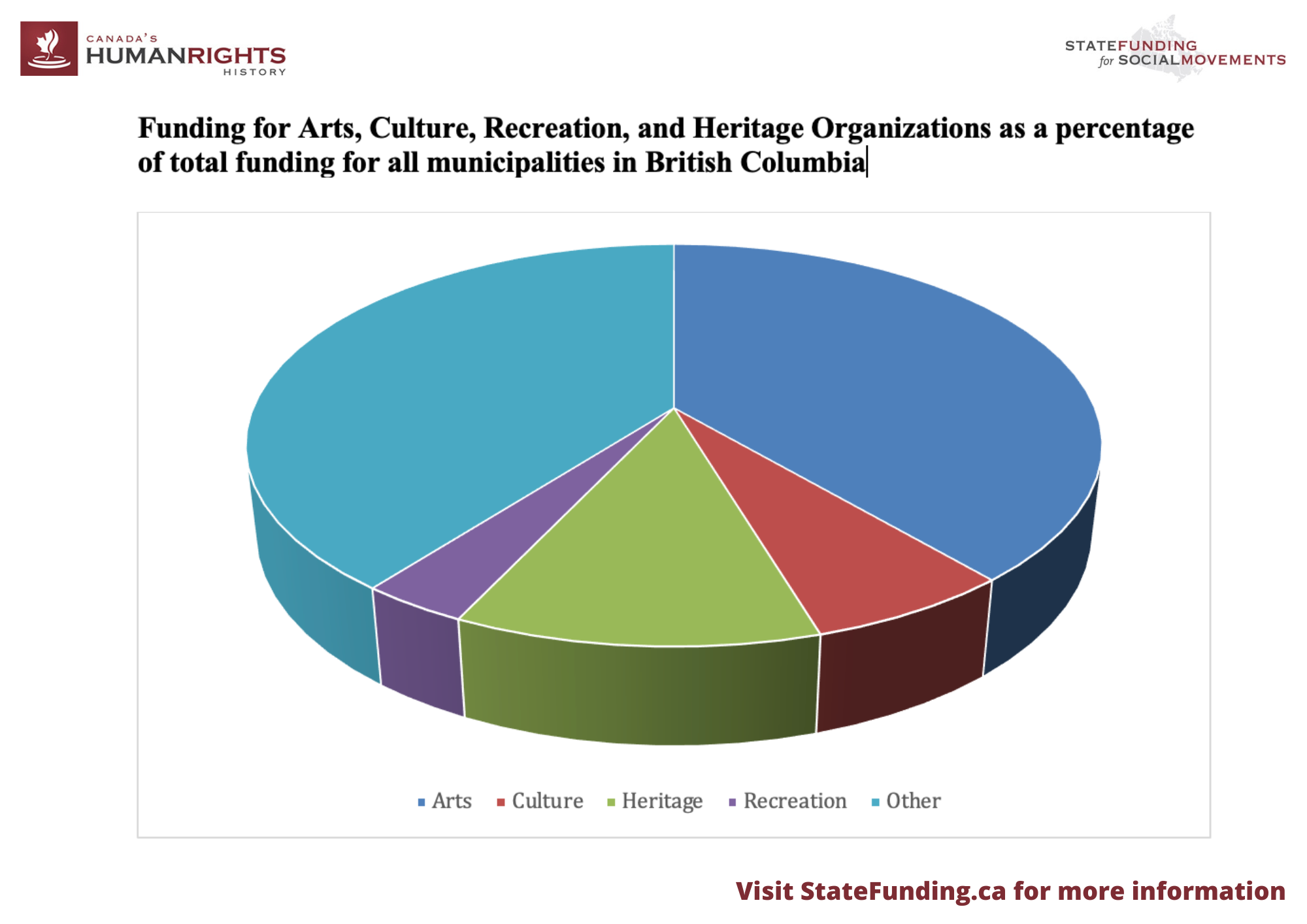
Secondly, funding is concentrated among a small number of organizations. Fifty per cent of all funding in each municipality (except Vancouver) went to ten or fewer organizations. In some municipalities, the number of recipients even declined while the amount of funding increased over time. Vancouver’s experience was the most extreme among municipalities. Fewer than five per cent of recipients received more than 50 per cent of all municipal funding.
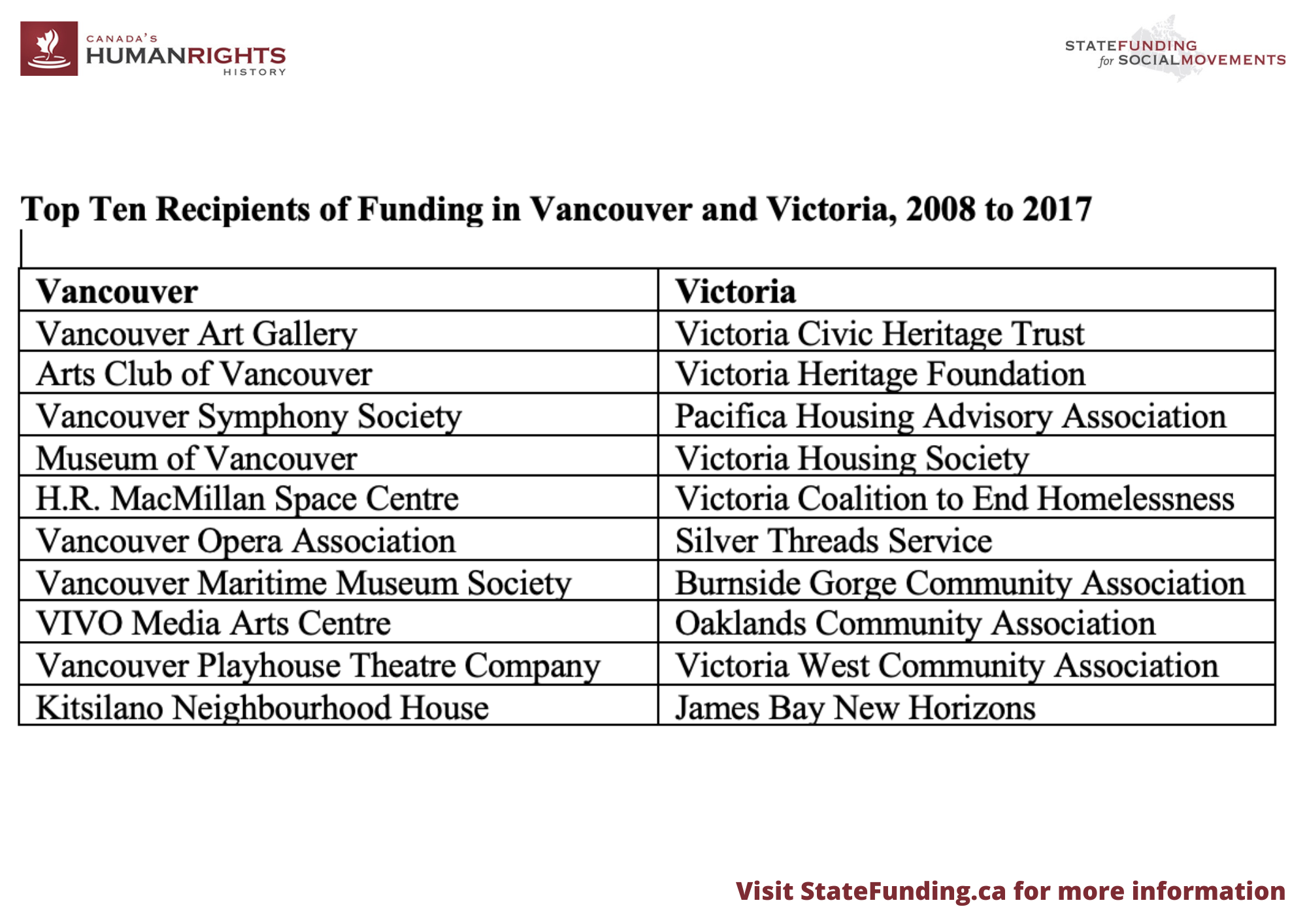
Thirdly, municipalities rarely provide sustaining funding for nonprofit organizations. The median grant in Vancouver in 2017 was only $17,304. And it was by far the most generous. In seventeen municipalities, the median grant was under $7000 (some as low as $1500). The median varied considerably in the other four municipalities, from $9850 in Campbell River and $10,000 in Prince Rupert to $31,500 in Chilliwack. In six municipalities, the median actually declined or remained the same over twelve years. Although there was an overall increase in the median grant over twelve years this was, nonetheless, insufficient to provide sustaining funding, especially for organizations operating in cities with high operating costs such as Kamloops, Kelowna, Vancouver, or Victoria. Moreover, few organizations received grants every year. Less than 9 per cent of organizations received a ten or more grants over twelve years. These factors would have made it difficult for most community service organizations to thrive unless they could secure alternative sources of funding.
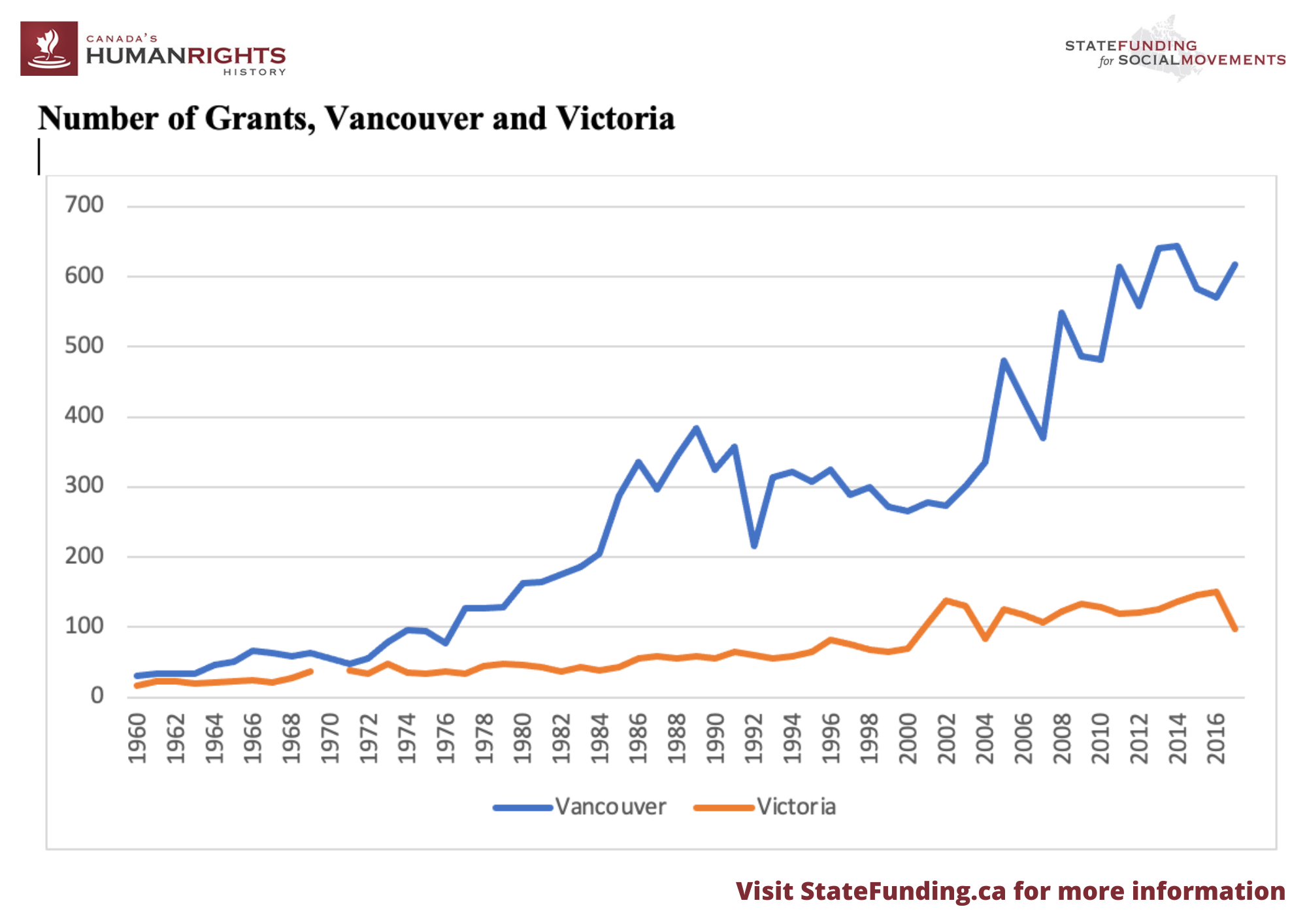
Finally, municipalities rarely support organizations committed to social change. To be sure, advocacy organizations such as the Vancouver Area Human Rights Coalition, Together Against Poverty (Victoria), and Community Partners Addressing Homeless (Prince George) have received municipal grants. Still, this was uncommon. When these types of organizations have secured funding, it was most often small grants of no more than $5000 to $20,000.
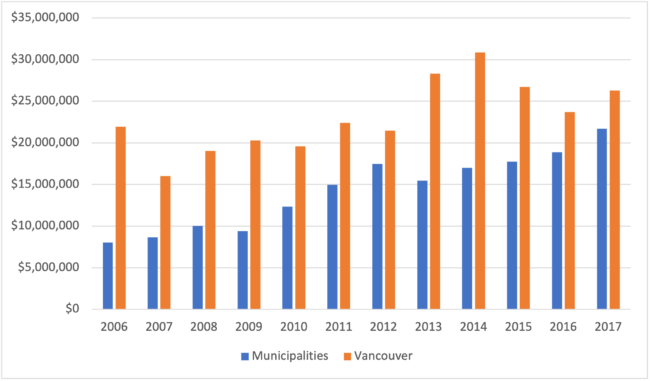
Our research also revealed how funding varies dramatically among municipalities. Victoria distributed $3.7 million in grants in 2017, which was significantly higher than municipalities with larger populations such as Kamloops ($2.9 million), Kelowna and Nanaimo (less than $2.5 million). Vernon also provides far less funding compared to municipalities that are much smaller. But Vancouver is the most indicative of the disparity among municipalities. Vancouver distributed more grant funding between 2006 and 2017 than the other 20 municipalities combined ($276,574,783 compared to $171,637,696). In other words, the nonprofit sector in a municipality of 631,486 people had access to almost double the amount of funding than twenty other municipalities’ combined 1,786,885 inhabitants spread over a vastly larger area.
This piece first appeared in Plan Canada. Contact the magazine to order a full copy of this article.
